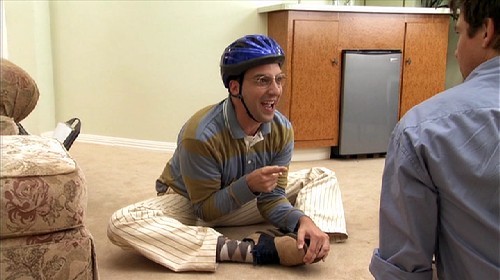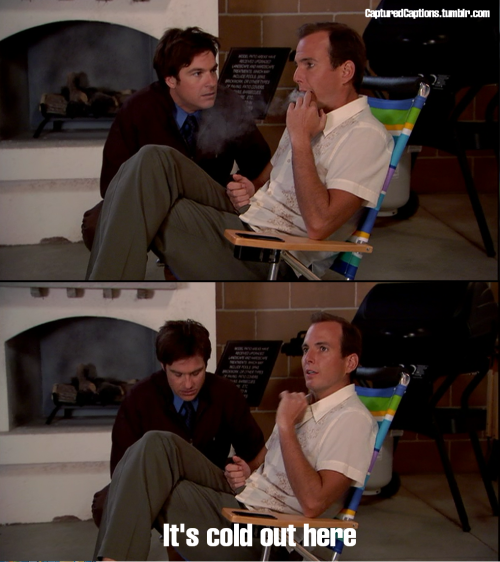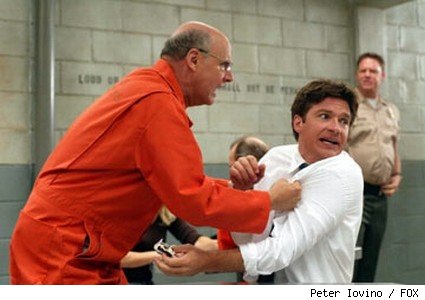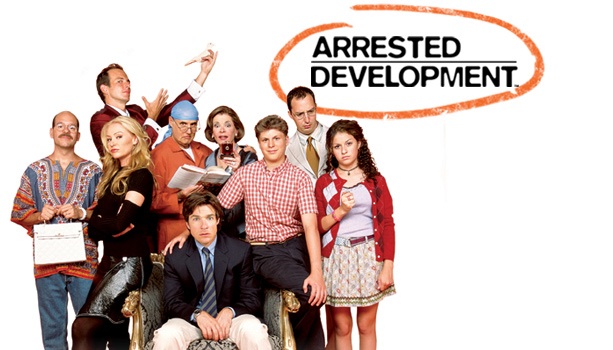“Now, the story of a wealthy family who lost everything, and the one son who had no choice but to keep them all together.
It’s Arrested Development.”
It’s Arrested Development.”
-The uncredited narrator Ron Howard during the quick slide-show introduction sequence
Run time: November 2, 2003 – February 10, 2006
Created by: Mitchell Hurwitz
Broadcast via: Fox
Arrested Development was the true anti-sitcom. It didn’t have a laugh track or a three-camera setup. It wasn’t filmed in front of a live audience, nor was it bound by a couple studio sets. It was presented almost as if a reality series, even though it was scripted, rehearsed and absurdist (and none of the characters acknowledged the camera). It was hyper and hyperbolic, a quick-witted and quick-paced show that naturalistically blended so many disparate influences into one of the most unique creations of serialized storytelling. Scathing topicality, wacky wordplay, continuity callbacks (and call-forwards), omniscient narration, eclectic intertextuality, ultra-aware postmodernism, allusions to incest as well as irony – nothing was too much to handle in this dense and reflexive live-action cartoon, a continuing saga about the riches-to-rags lives of a spoiled, snooty, selfish, scheming and super-materialistic family that nonetheless love and depend on each other. The Bluth family begins as a wealthy lot, with patriarch George Sr. (played by the blusteringly blissful Jeffrey Tambor) running a real estate development firm (as well as a frozen banana stand) to great success. Or so it seemed, until it is revealed that the company has been defrauding customers and engaging in some “light treason.” George goes to prison, and the spend-happy Bluths are roped in by his straight-man son Michael (the return of Jason Bateman!) to get their lives and livelihood back on track. The odyssey of these down-and-out folks makes for one of the best comedic misadventures to ever grace that proverbial boob tube.
It’s another case of too much of a good thing to last long enough. Arrested Development won several awards, critical acclaim and a devoted “cult-sized” following, but it never got the ratings it needed or deserved, and it was only allowed three seasons to shine. It’s the network/comedic equivalent of Deadwood in that sense. And in that line of thinking, Arrested Development started just as strong, taking an exceptionally well-made pilot episode and straight running with it, not encountering a bad episode in its path. It also featured a diverse ensemble cast of very distinct actors delivering some first-class work in a highly collaborative yet tightly orchestrated creative environment. That’s about where the similarities end, however. Deadwood was on HBO, and allowed to unleash any filthy word that came from the writers’ minds. AD was a show that was fairly naughty as well – it just had to be cuter about it, since it was broadcast on a family network during prime time. But by scaling back the swears (or bleeping whenever necessary) and ratcheting up the subtext, the writers still managed to make plenty of jokes about oedipal conflicts, sexual innuendo, body parts and other scatology, identity crises, self-sustaining narcissism, adolescent angst, aging, alcoholism, sibling rivalry, familial manipulation – and because they seldom swore, they somehow managed to never get offensive. They benefited from their own need to censor, and they often called themselves out on their own trappings (they mined chuckles out of every opportunity they got, always to good effect).
Before it was en vogue, Arrested Development employed a mockumentary styling that really hasn’t been attempted since. Not just content to pretend that their cameras are capturing spontaneity unfolding, the show utilizes abrupt cuts to supplemental materials to help get its point across. Security camera footage, archival footage, family photos, fake posters, website screen shots and various other pieces of imagery to make this fictional tale entrenched in its own alternate reality. And again, I gotta bring up Ron Howard, who narrates the on- (and off-)camera shenanigans succinctly. Not just on-the-ball with keeping the audience up to speed, he also engages in some surreal banter with the onscreen characters. Banter is the wrong word, actually; they do interact, but not directly. For instance, there is a scene where Michael is talking with his brother Gob (pronounced like the biblical Job, but frequently mispronounced as a lump or clot of something gross – it’s actually an acronym for George Oscar Bluth). They both went out to a bar the night before, and recall their misadventures. Michael slept with a blind attorney, while Gob (a pitch perfect Will Arnett) flirted with a woman (played by Arnett’s real life wife Amy Poehler), turning the encounter into a series of escalating dares, wherein they stayed up all night daring each other until they ended up getting married. But by the time they got to their hotel room, it was morning and she had to get to her job (before they could consummate anything).
MICHAEL: Boy, the lengths you will go to sleep with a woman.
GOB: Believe me, we didn’t do any sleeping. I had sex last night.
GOB: Believe me, we didn’t do any sleeping. I had sex last night.
NARRATOR (offscreen, not missing a beat): But he really didn’t.
GOB (satisfying himself more than anyone else): Yes, I did…
Howard’s voice is as essential a character as any member of the Bluth family. It’s perfectly in keeping with the off-the-walls approach of the comedy contained within. Even though we don’t see him, Howard’s narrator musters just as many guffaws as the rest of the brilliant cast. It’s a prime example of how nothing goes to waste of this show. Even bit players are every bit as apt to make us laugh out loud. This show is cast to perfection, and holy schlamoly, are there soooo many great actors on call here. The main cast that was assembled couldn’t have congealed more correctly. Casting is a crap shot, because no matter how well any individual is suited to their role, it’s all for nothing if the actors are not able to play well together. For such a random arranging, it sure works well more often than not, and Arrested Development deserves some recognition for this. Not only did it give us a major reason to love Jason Bateman (and that trademark wink of his) all over again, but it introduced us to Michael Cera, Tony Hale and Alia Shawkat. The main cast was incredible, not just for Tambor, Bateman and Arnett, or the new kids; there was Jessica Walther as the hyper- (and hypo-)critical mother Lucielle; and Michael’s twin sister Lindsay was played by Portia de Rossi, who did an amazing job of convincingly portraying a woman attracted to a guy like analysist-therapist (or, analrapist) Tobias Fünke, who was played to never-nude precision by David Cross. It was quite the dysfunctional family lineup, but add to that dozens of characters popping in and out through the fifty-plus episodes. Arrested Development has more talent per capita than any other series on this list, I’d wager. To whit: Dave Attell, Scott Baio, Justine Bateman, John Beard, Ed Begley Jr., Richard Belzer, Zach Braff, Dan Castellaneta, Gary Cole, Mo Collins, Rob Corddry, Bud Cort, Andy Dick, Jeff Garlin, Heather Graham, Judy Greer, Harry Hamlin, Ed Helms, John Michael Higgins, Michael Hitchcock, Clint Howard, Rob Huebel, Thomas Jane, Jamie Jennedy, John Laroquette, Julia Louis-Dreyfus, Jane Lynch, Jack McBrayer, Kevin McDonald, Liza Minnelli, Martin Mull, Frankie Muniz, Bob Odenkirk, Judge Reinhold, Andy Richter, Rob Riggle, Ian Roberts, Craig Robinson, Andy Samberg, Martin Short, J.K. Simmons, Richard Simmons, Ione Skye, Phyllis Smith, Ben Stiller, Christine Taylor, Charlize Theron, Dave Thomas, Alan Tudyk, Dick Van Patten, Carl Weathers, Henry Winkler… There’s more, of course, but I think you get the idea. Whether they were on for one episode of several, either as a fictional creation or a farcical self-parody, every person listed brought a new and fully realized character into this chaotically comedic family’s self-absorbed universe.
Since the show’s premature cancellation (though the crew obviously knew it was coming, as the later episodes made many jokes about its impending doom), the cult has remained strong, and thanks to home viewing and the internet, plenty more people have been catching up. There has been a lot of talk about a possible movie, but creator Mitchell Hurwitz has been pretty busy and, in fact, most of the people mentioned above have been doing pretty good for themselves. It’s hard to get that many good people together, and harder still to get them together years later when they’re increasingly famous and tied up. But whether it happens or not, I gotta say, this short-lived show is never short of complete. It’s surprisingly great storytelling, and it’s a new style of comedy that I hope never catches on. Arrested Development has its own style, it makes its own statement, and sometimes I’m thankful that it never had a chance to spoil itself.
BEGINNING & END CREDITS SCORE: 1.5/2
Quick and the point, just like the series itself. Seldom starting with a cold opening, each episode begins with the show’s jumpy theme music and a series of slides introducing the audience to the Bluth family. It’s another good case of a not-too-much-never-too-little type of intro. The end credits theme is a little jazzier, almost like a ‘70s day time talk show, sending out the viewer of a festive vibe.

BEST CHARACTER: Byron “Buster” Bluth (played by Tony Hale)
I love Buster. In a show filled with mostly hard-to-side-with sick and twisted individuals, Buster is one of the few (mostly) good-natured people. The youngest of George Sr. and Lucielle’s kids, he’s a stern foreshadowing of what George Michael (Michael Cera’s character, not to be confused with “the singer/songwriter”) could be, in that he’s endured a life of confinement due an overbearing and highly judgmental parent, and he is often nervous but curious whenever he steps out into the world. He dates a woman his mother’s age (also named Lucielle), and has a disfiguring encounter with a loose seal (get it?) while taking a swim in the ocean. Normally, this kind of character would be a bit of a creep, but Tony Hale played him with a sweetness, naivety and vulnerability that was never less than hilarious, yet always rooted in a strangely relatable sense of longing for acceptance.


BEST SEASON: 2 (of 3 total)
Though it had a slightly shorter run (18 episodes instead of 22), the second season found the show going full speed ahead towards nowhere in particular (though Michael is initially headed for Phoenix, Arizona before he’s ordered by the court to stay in state) with the same temerity and tenacity that made the first so famous. I find the second season to be the best because it’s far enough along to still be going strong, maintaining its continuing storyline with plenty of the good humor that made it so appealing in the first season. And it’s far away from the end of the show’s run that it doesn’t make you wince at the end of each episode as you realize you’re one step closer. This season had plenty of memorable moments: Tobias discovering and becoming a stand-in for the Blue Man Group ("I blue myself!"), the fifteen-year-old Maeby getting a job as a movie studio executive, Tobias and Lindsay deciding to have an “open” relationship, Buster joining the Army (and then getting kicked out by becoming a self-proclaimed monster), George Michael and bland Anne’s (literal) music burning party that turns into a (copying) music burning party, the return of the Hot Cops male dancer squad, Michael & Maeby singing "Afternoon Delight" without realizations its true connotations, Buster’s first drink of alcohol since nursing, Motherboy, Mrs. Featherbottom, Ice the Bounty Hunter/Party Planner, the introduction of Franklin the puppet, and Ron Howard’s sly critiques of shotty narration. And that’s just scratching the surface of what makes this season (and series) such an irreverent masterpiece.

BEST EPISODE: “Pier Pressure” (Season 1, Episode 10)
The set up alone is hilarious: having been scared by his father’s own “valuable life lessons” (achieved through elaborate means and a one-armed wingman), Michael decides he still must teach his son George Michael a lesson when he discovers that the boy is trying to procure pot (assumed to be due to stress from slipping grades in school, but actually to help his Uncle Buster’s girlfriend with her vertigo-induced nausea). But as all the pieces move into place, the set up becomes nothing compared to the pay off scene set at the titular pier. Without giving anything away, a valuable lesson is indeed learned, and the Hot Cops make for lousy police. This is a solid episode, as good as AD gets, and an early example of just how amazing the show is.

BEST MOMENT: “…There’s Always Money In The Banana Stand!!!” (From “Top Banana,” Season 1, Episode 2)
In the second episode of the series, Michael begins to realize just how much trouble the Bluth family is. Consulting his dad in prison, he continues to fret over their well being, to which George Sr. simply clicks his tongue and says, “There’s always money in the banana stand.” Out of options and with nothing left to lose, Michael decides to burn down the banana stand to collect the insurance money (as well as make a statement to his father about taking control of the company’s direction). When he tells George Sr. this, his father suddenly gets exasperated, revealing that there was $250 thousand dollars in cash lining the stand’s walls. As Michael tries to takes this in, the elder Bluth angrily grabs his son and demands, “How much clearer can I say, ‘There’s always money in the banana stand!’?” – it’s a sublime moment, perhaps the best thing Arrested Development (or any good show) can strive for.

SPECIAL CATEGORY
BEST CHARACTER NAME: BOB LOBLAW (played by Scott Baio)
There’s a plethora of interesting names for characters in Arrested Development – Maeby Funke (or, as George Michael often introduces her, “My cousin, Maeby,” which is the double entendre that it reads as), Maggie Lizer (as in “lies her ass off), Gene Parmesan, Kitty Sanchez, “Annyong” – but the best one was easy for me to identify (even if belonged to the character played by Chaci from Happy Days). Unlike choosing my favorite character, I knew exactly who deserved this spot. In fact, who am I kidding? I created this entry especially for Bob Loblaw. A super serious lawyer brought in to replace the incompetent Barry Zuckerkorn (played by the guy who played The Fonz – get it?), Mr. Loblaw has some of the finest advertising on the air (“Why should you go to jail for a crime someone else noticed?” being my favorite) and perhaps the coolest blog name around: The Bob Loblaw Law Blog. Pure tongue-twisting genius.

No comments:
Post a Comment